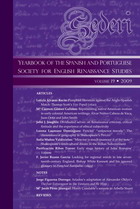
Sederi 19
Sederi 19 — 2009
EDITOR
Ana Sáez-Hidalgo
REVIEW EDITOR
Francisco José Borge López
ISSN 1135-7789
John J. Joughin, “Dividuated selves: on Renaissance criticism, critical finitude and the experience of ethical subjectivity.” SEDERI 19 (2009): 47-71.
DOI: https://doi.org/10.34136/sederi.2009.3 Download PDF
Abstract
This paper situates the work of Renaissance criticism as a type of belated work of mourning or memorial aesthetics. In particular I want to focus on the emergence of a supposedly “modern” form of subjectivity during the theorisation of Renaissance criticism in the eighties –its distinctiveness as well as its occlusions. For the purpose of this essay I take the work of the British critic Francis Barker as, in some sense, broadly representative of a trend in political criticism that was focused on a recovery of the lost significance of the body as a site of subjection. However, I will also argue that the relocation of the mind-body split in the first wave theorisation of Renaissance criticism needs to be read again. The founding dividuation of self in this early criticism is now often criticised for positioning the subject in reductively functionalist or mechanistic terms, as the product of the discourse of power/knowledge that produced it. However, in much of the work that we label cultural materialist or new historicist, the experience of dualism also secreted an ethical standpoint that is worthy of our re-evaluation. In particular, and in building on the insights of Gillian Rose and Judith Butler on mourning, I suggest that the lyrical contemplation of lost bodies in radical criticism implicates our ties to others, as well as the relational ties to others implicit in any political sense of community. In turn, this suggests a more sophisticated account of political subjectivity, as well as a potential reparation of the concept of a political self for radical criticism.
Keywords: Memorial aesthetics; mourning; finitude; subjectivity; Shakespeare; cultural materialism.
References
Aers, David 1992. “A Whisper in the Ear of the Early Modernists; or, Reflections on Literary Critics Writing on the ‘History of the Subject’.” Ed. David Aers. Culture and History, 1350-1600: Essays on English Communities, Identities and Writings. Detroit: Wayne State University Press: 177-202.
Barker, Francis 1984. The Tremulous Private Body: Essays on Subjection. London: Methuen.
Barker, Francis 1993. The Culture of Violence: Tragedy and History. Manchester: Manchester University Press.
Belsey, Catherine 1985. The Subject of Tragedy: Identity and Difference in Renaissance Drama. London: Routledge.
Benjamin, Walter 1968. Illuminations. Ed. Trans. H. Zohn, introd. H. Arendt. London: Fontana.
Benjamin, Walter 1992 (1928). The Origin of German Tragic Drama. Trans. John Osborne. London: New Left Books.
Bernstein, Jay 1992. The Fate of Art: Aesthetic Alienation from Kant to Derrida and Adorno. Cambridge: Polity Press.
Bernstein, Jay 1993. “Autonomy and Solitude.” Ed. Keith Ansell Pearson. Nietzsche and Modern German Thought. London: Routledge: 192-215.
Bernstein, Jay 2006. Against Voluptuous Bodies: Late Modernism and the Meaning of Painting. Stanford: Stanford University Press.
Bowie, Andrew 1997. From Romanticism to Critical Theory: The Philosophy of German Literary Theory. London: Routledge.
Bowie, Andrew 2003 (1990). Aesthetics and Subjectivity: From Kant to Nietzsche. Manchester: Manchester University Press.
Butler, Judith 2004. Precarious Life: The Powers of Mourning and Violence. London: Verso.
Calbi, Maurizio 2001. Approximate Bodies: Aspects of the Figuration of Masculinity, Power and the Uncanny in Early Modern Drama and Anatomy. Salerno: Oedipus.
Carroll, John 1993. Humanism: The Wreck of Western Culture. London: Fontana Press.
Critchley, Simon 1998. “Introduction: What is Continental Philosophy.” Ed. Simon Critchley and William R Schroeder. A Companion to Continental Philosophy. Oxford: Blackwell: 1-17.
Critchley, Simon 2007. Infinitely Demanding: Ethics of Commitment, Politics of Resistance. London: Verso.
Derrida, Jacques 1992 (1986). “Aphorism Countertime.” Ed. Derek Attridge. Acts of Literature. London: Routledge: 414-33.
Derrida, Jacques 1994. Specters of Marx: The State of the Debt, the Work of Mourning, and the New International. Trans. P. Kamuf. London: Routledge.
Descartes, Rene 1986 (1641). Meditations on First Philosophy. Trans. J. Cottingham. Cambridge: Cambridge University Press.
Docherty, Thomas 1996. “Tragedy and the nationalist condition of criticism.” Textual Practice 10/3: 479-505.
Dollimore, Jonathan 1989 (1984). Radical Tragedy: Religion, Ideology, and Power in the Drama of Shakespeare and his Contemporaries. Brighton: Harvester Wheatsheaf.
Eagleton, Terence 1990. The Ideology of the Aesthetic. Oxford: Basil Blackwell.
Foakes, R. A. 1997. “Introduction.” Ed. R. A. Foakes. King Lear. Walton-on-Thames: Thomas Nelson and Sons Ltd, The Arden Shakespeare: 1-151.
Greenblatt, Stephen 1980. Renaissance Self-fashioning: From More to Shakespeare. Chicago: University of Chicago Press.
Greenblatt, Stephen 1988. Shakespearean Negotiations: The Circulation of Social Energy in Renaissance England. Oxford: Clarendon.
Greenblatt, Stephen 2001. Hamlet in Purgatory. Princeton: Princeton University Press.
Hartman, Geoffrey H. 1996. “Shakespeare and the Ethical Question.” English Literary History 63: 1-23.
Haase, Ullrich and Large, William 2001. Maurice Blanchot. London: Routledge.
Joughin, John J. 2002. “Lear’s Afterlife.” Shakespeare Survey 55: 67-81.
Joughin, John J. 2006A. “Shakespeare’s Memorial Aesthetics.” Ed. Peter Holland. Shakespeare, Memory and Performance. Cambridge: Cambridge University Press: 43-62.
Joughin, John J. 2006b. “Richard II and the Performance of Grief.” Eds. Dermot Cavanagh, Stuart Hampton-Reeves and Stephen Longstaffe. Shakespeare’s Histories and Counter-Histories. Manchester: Manchester University Press: 15-31.
Keats, John 1891. Letters of John Keats to his Family and Friends. Ed. by Sidney Colvin. London. Macmillan and Co.
Rorty, Richard 1989. Contingency, Irony and Solidarity. Cambridge: Cambridge University Press.
Rose, Gillian 1995. Love’s Work. London: Chatto and Windus.
Rose, Gillian 1996. Mourning Becomes the Law: Philosophy and Representation. Cambridge. Cambridge University Press.
Shakespeare, William 1991. Richard II. Ed. by Peter Ure. London: Arden.
Shakespeare, William 1997. King Lear. Ed. by R. A. Foakes. Walton-on-Thames: Thomas Nelson and Sons Ltd, The Arden Shakespeare.
Shakespeare, William 1967. Romeo and Juliet. Ed. by T. J. B. Spencer. Harmondsworth: Penguin Books, The New Penguin Shakespeare.
Tate, Nahum 1992 (1681): “Dedication and Prologue to King Lear.” Ed Frank Kermode. Shakespeare: King Lear. Basingstoke: Macmillan: 25-6.
Taylor, Charles 1989. Sources of the Self: The Making of Modern Identity. Cambridge: Cambridge University Press.
Wheeler, Wendy 1999. “Melancholic Modernity and Contemporary Grief: The Novels of Graham Swift.” Ed. Roger Luckhurst and P. Marks. Literature and the Contemporary: Fictions and Theories of the Present. Harlow: Longman: 63-79.
